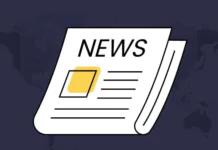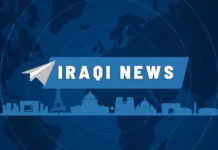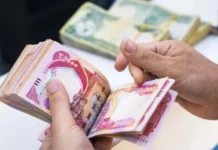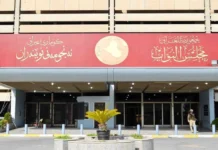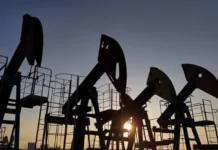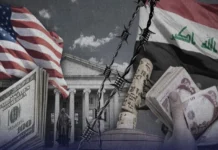An Economic Expert Calls For Canceling The Currency Sale Window
July 14 10:22 Information / Baghdad… Economist Diaa Al-Mohsen called for canceling the currency selling window, pointing out that some beneficial political blocs were behind the continuation of this window to achieve financial gains.
Al-Mohsen told Al-Maalouma, “The citizen’s interest necessitates the government to go towards canceling the currency selling window, in order to end the confusion occurring in monetary policy.”
He added, “The late former Central Bank Governor Sinan Al-Shabibi was behind opening the currency selling window for 4 years at that time in order to eliminate the inflation taking place in the country after its rate reached 50%.” He stated that “some political blocs have financial interests that push for the continuation of the operation of the currency selling window, to make it a gateway to financial gain, despite the absence of the need for it.”
https://almaalomah.me/news/70242/economy/خبير-اقتصادي-يدعو-الى-الغاء-نافذة-بيع-العملة
The exchange rate of the Iraqi dinar is fixed and established: there is no influence of the parallel market
July 14, 2024 Last updated: July 14, 2024 The Independent/- Advisor to the Iraqi Prime Minister for Financial Affairs, Mazhar Muhammad Salih, confirmed that
the exchange rate in the parallel market does not affect the stability of the general level of prices in the country.
Highlights of the statement:
External factor: International banking compliance controls affect the demand for dollars from Iraqi bank accounts.
Internal factor: Some people exploit the external factor to achieve profitable gains.
Dominance of fixed exchange rate system: Strong international reserves covering 100% foreign currency.
Strength of the central exchange market: The official exchange rate of the dollar against the dinar in the parallel market does not affect price stability.
Financing foreign trade: 90% of Iraq’s foreign trade is financed at the official exchange rate (1,320 dinars to the dollar).
Price stability: Annual inflation in Iraq does not exceed 3%.
Foreign reserves: exceeding $100 billion. The
official exchange market: dominant to contain any fluctuations in the parallel market.
Decline of the dollarization phenomenon: Internal transactions are carried out in Iraqi dinars. The
influence of the parallel market is limited: only 10% of the total currency supply and demand transactions.
Exchange rate stability: real and well-established resulting from strong monetary and fiscal policies.
Inflation containment: There are no longer any inflationary expectations generated by the parallel market.
The Iraqi dinar is characterized by real and well-established stability in its price, and is not affected by the fluctuations of the parallel market.
This stability is due to the
strength of the fixed exchange rate system, the
effectiveness of monetary and financial policies, and the
high value of foreign reserves.
https://mustaqila.com/سعر-صرف-الدينار-العراقي-ثابت-وراسخ-لا-ت/
Iraqis Keep 90 Trillion Dinars Inside Homes: A Crisis Of Confidence Or An Economic Crisis?
Special Sumerian 2024-07-14 | 07:23 Alsumaria – Iraq News Iraqis keep 90 trillion dinars inside homes: a crisis of confidence or an economic crisis?
Due to the decline of the banking system, Iraqis keep a cash supply estimated at 90 trillion dinars inside their homes
Due to the lack of confidence and the decline of the banking sector, Iraqis are hoarding about ninety trillion dinars inside their homes,
a step that specialists say has caused a significant decline in the monetary supply within the market.
How can the Iraqi government restore citizens’ confidence in the banking sector?
https://www.alsumaria.tv/news/alsumariaspecial/493790/العراقيون-يحتفظون-بـ-90-تريليون-دينار-داخل-المنازل-أزمة-ثقة-أم-أزمة-اق
The Controversy Of Foreign Banks Taking Over The “Iraqi Dollar Auction”… A Comprehensive Breakdown Of The Reasons
Economy 2024-07-14 | 3,518 views Alsumaria News-Economy Today, Sunday, the researcher in banking and economic affairs, Mustafa Hantoush, reviewed the reasons for foreign banks’ acquisition of the largest percentage of shares in some banks inside Iraq and their acquisition of the currency auction, as the
strengths of these banks are that they are owned by foreign banks that are able to open accounts easily in application of international standards. American banks that supply the dollar. Hantoush told Al-Sumaria News,
“Some foreign investors and foreign banks obtained a percentage of shares of more than 51% in some banks inside Iraq, even though the Companies Law prohibits giving the foreign investor more than 49%.”
However, Hantoush reviewed the existence of a “legal loophole” that enabled the Central Bank to grant foreign investors greater percentages than those stipulated in the Companies Law, noting that
Article 107 of the Banking Law No. 94 of 2004 gives the authority to the Board of Directors of the Central Bank to determine the percentage of foreign investor ownership in banks without Compliance with general laws.
He considered that this paragraph is not supposed to mean that the percentage be more than 50%, but rather that it be less,
but the loophole is that the legal article gave absolute authority without mentioning that the percentage be less or more than 49%.
He explains that “there is no grant in the world of a share greater than 50% except in countries where there is a high circulation of funds, as they are bankrupt countries that do not possess wealth and fear the control of foreign banks.”
He explained, “According to this strategic mistake, foreign banks were given more than 60% of the shares in banks inside Iraq, and
today we began to observe the fruits of this mistake, when the American side became aware of the presence of currency smuggling operations and trade with Iran and Syria, and they set conditions for compliance.
The bank failed.”
The Central Bank of Iraq and Iraqi banks apply the standards or the possibility of opening accounts for Iraqi banks in American banks to achieve oversight and fund their accounts in dollars.” He pointed out that
“when this happened and the scene became empty of Iraqi banks capable of taking on this role, these
foreign banks operating in Iraq were put forward, and
through the governors of the central banks of the countries of origin of these banks, they
presented themselves as a solution before Washington instead of presenting themselves as a mediator between Iraq.” And America.” He stressed that
“Indeed, American banks relied on these foreign banks operating in Iraq, and
they opened accounts for them in Citibank and JP Morgan, for their parent banks in other countries, which own the largest part of these banks inside Iraq,
even though these banks in Iraq do not perform well.” To achieve 5 points in global standards, it relied on its parent banks located in other countries.
Accordingly, Iraq are financed is now taking the dollars it owns in the US Federal Reserve,
and through them the accounts of these banks open in the accounts of Jeep Morgan and Citi Bank,
and from there the dollars are transferred to the rest of the world for Iraqi merchants,
and the merchants deposit the dinars in the Central Bank of Iraq.”. He explained,
“Iraqi banks cannot play this role because they cannot open accounts in Citibank and Jeep Morgan because they do not have branches in countries trusted by the American banking system.
Also, the Central Bank of Iraq failed to guarantee Iraqi banks in front of American banks, and it succeeded earlier in 5 banks.”
But it only lasted a month and then these banks were punished, and
they were also guaranteed by Jordanian banks.” He stressed that
“it is not possible to rely on foreign banks to manage the Iraqi banking system.
This model has failed in India because of its reliance on the foreign banking system, as the
foreign bank gives profits to its parent branches abroad, and does not reinvest the profits here inside Iraq,”
calling on the Central Bank to
“Finding a solution for trade with Iran and Syria,
strengthening the Iraqi banking system and guaranteeing it to American banks, and
opening accounts for Iraqi banks to experiment with American banks.”
Iraq Records A Huge Jump In Non-Oil Revenues Within 5 Months Of 2024
July 14, 2024 Last updated: July 14, 2024 The Independent / Follow-up / – The latest financial data revealed that non-oil revenues in Iraq witnessed a huge jump during the first five months of 2024 compared to the same period last year.
A source in the Ministry of Finance confirmed that Iraq’s total revenues rose by 20.1%, reaching 54.70 trillion Iraqi dinars, compared to 45.55 trillion Iraqi dinars in the same period in 2023.
The source indicated that non-oil revenues rose significantly, reaching 7.06 trillion Iraqi dinars, which represents a contribution rate of 11.5% of the total revenues, compared to only 0.09 trillion Iraqi dinars in the same period last year, which represented 0.19. Only % of total revenue.
The source explained that the increase in non-oil revenues is due to the increase in taxes on income and wealth by 118.6%, and production fees by 285.4%, in addition to the huge increase in capital revenues by 375.2%.
He added that other revenues also saw a significant increase of 453.4%.
Regarding oil revenues, they increased by 6.5%, reaching 48.41 trillion Iraqi dinars, compared to 45.46 trillion Iraqi dinars in the same period last year.
Despite this increase, the percentage of oil revenues’ contribution to total revenues decreased from 99.81% to 88.5%.
Transfer taxes also rose by 121.9%, reflecting government efforts to improve the tax system and increase revenues from non-oil sources.
However, the source stressed that there are major challenges facing the government in maintaining this momentum and further diversifying revenue sources.
On the other hand, the data did not show the method or size of the corresponding expenditures, and whether there was a surplus or deficit in the budget during the same period.
It is noted that the Ministry of Finance may deliberately or refuse to publish a list of expenditures, whether operational or investment, for fear of being exposed to criticism from the media or observers and those interested in economic and political affairs.
Financial statements for the first five months of 2024 reflect a significant improvement in Iraq’s non-oil revenues, which contributes to enhancing the country’s financial and economic stability.
However, the Iraqi government remains facing major challenges in diversifying the economy and increasing reliance on non-oil revenues to ensure sustainable economic growth.
The question remains about expenditures and the extent of their transparency, which may reveal other aspects of the economic challenges facing the country. https://mustaqila.com/العراق-يسجل-قفزة-هائلة-في-الإيرادات-غي/
